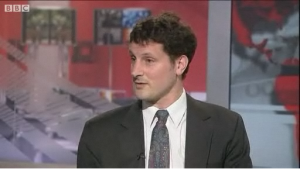Microfinance as an allegory for aid
Microfinance has been touted as a 'bottom up solution' to poverty. The Nobel Peace Prize 2006 was awarded jointly to Muhammad Yunus and Grameen Bank "for their efforts to create economic and social development from below." Give people access to credit, the story went, and they will be able to invest in businesses of their own. The Acumen Fund promises "Dignity not Dependence. Choice not charity."
But in the latest episode of Development Drums, David Roodman explains that rigorous evaluations of micro-credit suggest that, on average, it has no effect on poverty. (The results are more positive for other financial services.)
Why then, David asks, does he witnesss women queueing up enthusiastically for their loans? Should he explain to them that, according to the results of complex evaluations, microfinance is doing them no good? Are they mistaken about what is in their interest?
David's answer is that while microcredit has, on average, no effect on poverty, it can produce significant benefits for the poorest people, by enabling them to manage volatile and uncertain incomes. We should think of microcredit not as a catalyst for economic growth, but as a utility, providing a key service to poor people. Subsidizing the provision of this service is a relatively low-cost way to help people to increase their welfare.
Int his book, Due Diligence: An impertinent enquiry into microfinance, David explodes the lavish claims made by the microfinance industry about the difference it makes, while accepting that financial services have an important role to play in supporting poor people.
This is, I think, a microcosm of a bigger story about aid as a whole. There is plenty of evidence that aid improves people's lives, for example by providing food, water, education and health. It is much harder to show that aid catalyses economic, social and political transformation. (This is partly because, even if aid did have such effects, they would be very difficult to demonstrate statistically.)
As in the case of microfinance, the aid industry tends to over-promise and under-deliver. Everyone wants individuals and countries to be able to stand on their own two feet, and not depend on hand-outs from others. But it does not follow that microfinance can bring this about for individuals, nor that aid can bring it about for countries. Setting this as the standard for success undermines the case for both, by neglecting the very important and demonstrable success of both against more realistic objectives, of helping people to live better lives while that process of development is taking place.
You can listen to Development Drums here on the website, or you can subscribe to it free in iTunes.
(verzonden vanaf tablet)
